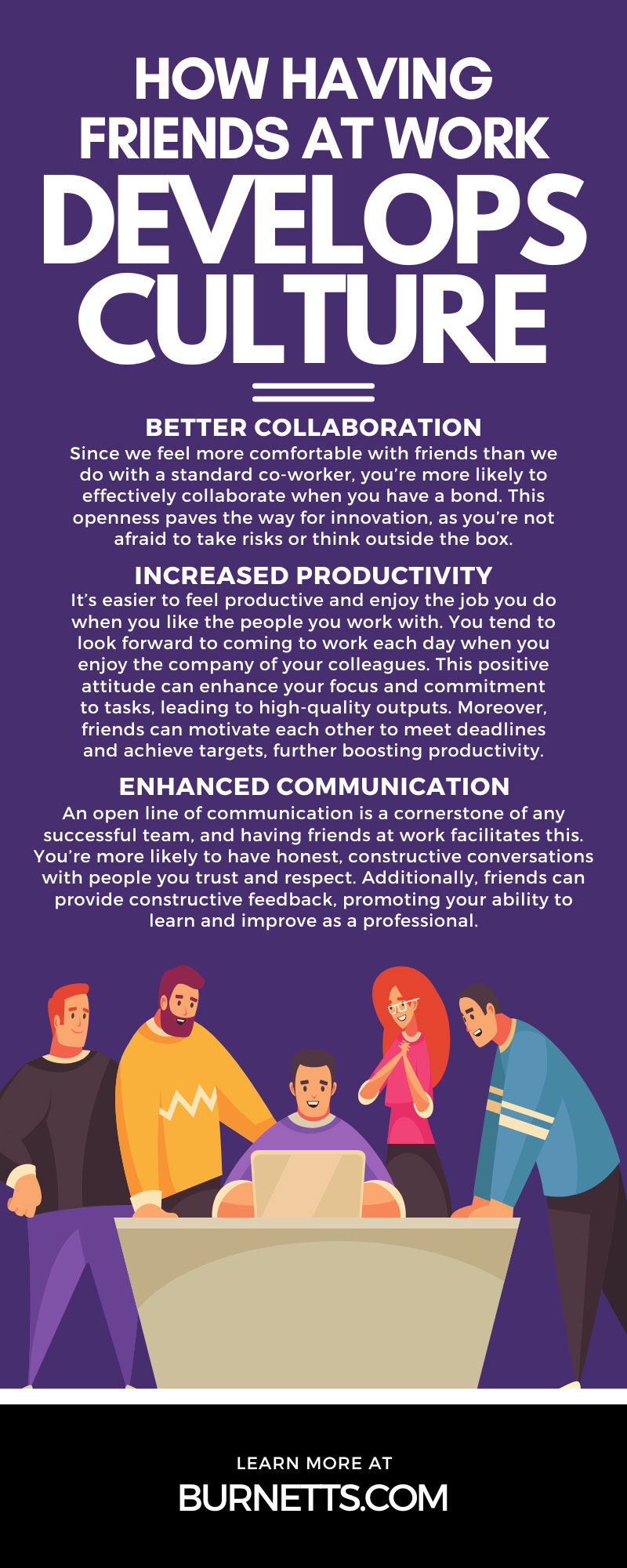
Having friends at work can transform the culture into a more welcoming environment that’s more open to creativity and innovation. Additionally, friendships in the workplace break down barriers between departments, promoting cross-functional collaboration and the exchange of diverse ideas. We discuss how having friends at work develops culture and share tips for fostering meaningful relationships in this guide.
Why Work Culture Matters
Company culture is the life force of any organization. It shapes the way employees interact with each other and their attitudes toward their job. A robust work culture fuels productivity, elevates morale, and lowers employee turnover rates.
Moreover, you’re more likely to rely on your work friends in your times of need when you develop strong bonds with your colleagues. Like any relationship, work friendships provide us with a sense of support and comradery. For instance, you have someone to vent with at lunch during a stressful day; similarly, you’re more likely to feel comfortable voicing your ideas at team meetings.
How Having Friends at Work Boosts Culture
Having friends at work develops culture in many ways and takes your job beyond the standard 9-5 grind. It fosters a sense of belonging and purpose within an organization as employees feel more connected and invested in their work when they have friends by their side.
Some of the top benefits of having friends at work include:
- Better collaboration
- New opportunities
- Increased productivity
- Enhanced communication
- Decreased stress
A supportive environment makes work less stressful and more enjoyable, leading to increased job satisfaction and lower turnover rates.
Better Collaboration
Since we feel more comfortable with friends than we do with a standard co-worker, you’re more likely to effectively collaborate when you have a bond. This openness paves the way for innovation, as you’re not afraid to take risks or think outside the box.
Additionally, you’re more likely to ask for help as you need it since you have someone to go to first. Reaching out for assistance requires a level of vulnerability and isn’t always easy, but it’s easier when we trust the person.
New Opportunities
Having a strong network within your organization increases your visibility and potential for growth. Your colleagues may introduce you to new projects, connect you with important contacts, or even help you advance your career.
Healthy Competition
Working with friends also encourages healthy competition, increasing motivation and innovation. Having passionate and driven friends can motivate you to work harder and strive for success.
Increased Productivity
It’s easier to feel productive and enjoy the job you do when you like the people you work with. You tend to look forward to coming to work each day when you enjoy the company of your colleagues. This positive attitude can enhance your focus and commitment to tasks, leading to high-quality outputs. Moreover, friends can motivate each other to meet deadlines and achieve targets, further boosting productivity.
Enhanced Communication
An open line of communication is a cornerstone of any successful team, and having friends at work facilitates this. You’re more likely to have honest, constructive conversations with people you trust and respect. Additionally, friends can provide constructive feedback, promoting your ability to learn and improve as a professional.
Decreased Stress
Knowing you have a support system makes you less likely to feel overwhelmed by challenges or setbacks. Friends can provide perspective, offer advice, or simply lend a sympathetic ear during tough times. This level of compassion can prevent burnout and help you maintain your mental well-being.
Emotional Support
You’ll feel less isolated and more connected to your colleagues when you have friends in the workplace. Having emotional support fosters a sense of belonging which is crucial to job satisfaction—we all like to know we matter.
Ways To Make Friends at Work
Having friends at work isn’t just a pleasant bonus. It’s a crucial element of a thriving work culture. You can expand your social circle at the office by actively seeking opportunities for connection and engagement. Try to consider the following options to make friends at work:
- Attend team builders.
- Offer your assistance.
- Make conversation more often.
Developing professional friendships takes time and effort. As you begin building these relationships, you may have to experiment with different approaches to find what works best. But with persistence, you can build a strong network of friends that will enhance your career experience and contribute to a positive and dynamic culture.
Attend Team Builders
Team building activities provide an excellent opportunity to connect with coworkers in a more relaxed setting. Often, companies organize team-building events, such as retreats, volunteering activities, or sports tournaments. These activities bring individuals together and foster teamwork, communication, and trust.
Participating in these events is important because it takes you out of the professional environment. You can get to know your colleagues and discover shared interests or hobbies without the pressure of completing required tasks at team-building events.
Pro Tip
Suggest organizing some team-building events yourself if your company doesn’t offer them. This initiative can help you make new friends and demonstrate your leadership skills and commitment to a positive work culture.
Offer Your Assistance
Offering your assistance shows your willingness to support your peers and demonstrates your team spirit. This gesture can significantly contribute to building trust and fostering friendships. Additionally, you can learn more about each other’s strengths and work styles by working together on a task or project.
Make Conversation
Getting to know your colleagues beyond their work duties is an excellent way to form meaningful connections. Making conversation can help you develop rapport and find common interests with your coworkers, whether you have lunch together or chat during breaks.
While talks should remain workplace-appropriate, they don’t have to revolve around your job. For example, ask about your colleague’s return from a week-long trip to Europe. Likewise, talk about shared interests and how you partake in hobbies.
Bonus: Go Into the Office
Consider going into the office occasionally if you work remotely. Being physically present allows for more natural social interactions and opportunities to connect with your colleagues.
Contact Burnett’s Staffing
You can contribute to a more collaborative, innovative, and enjoyable work environment by actively cultivating friendships within the workplace. At Burnett’s Staffing, we work closely with employment seekers looking for jobs in Dallas-Fort Worth, TX. We’ll match your professional goals and personality to the ideal employment option. Get in touch with us for help finding a career you’ll love!

